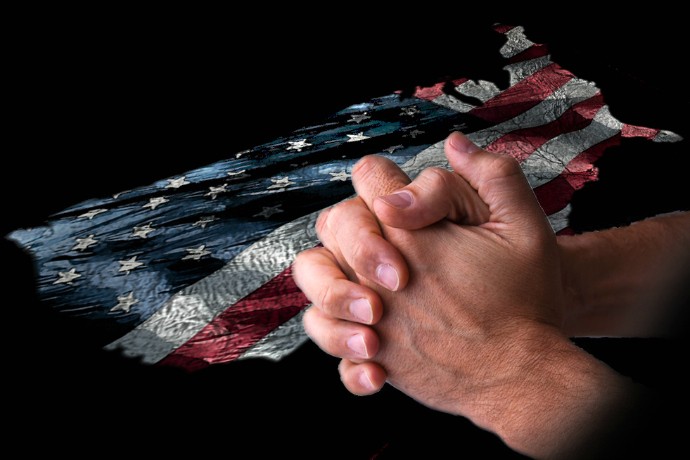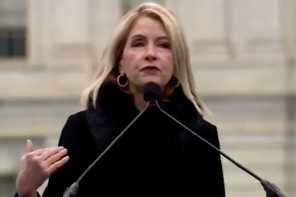Today is the National Day of Prayer in the United States, an annual day of observance that was formally established by Congress in 1952. The law that establishes a National Day of Prayer (36 U.S.C. § 119) falls under Title 36, which outlines various patriotic observances including Mother’s Day and Save Your Vision Week. According to the law,
The President shall issue each year a proclamation designating the first Thursday in May as a National Day of Prayer on which the people of the United States may turn to God in prayer and meditation at churches, in groups, and as individuals.
Albeit technically ecumenical, the National Day of Prayer has traditionally been a rallying point for conservative evangelical Christians. Its main organizer is the private National Day of Prayer Task Force, led by Shirley Dobson (wife of James Dobson). Moreover, the phrasing of the law privileges monotheistic beliefs by explicitly mentioning a singular God. The National Day of Prayer is a reminder that, even in a republic founded on the principle of religious liberty, those in power can enshrine their beliefs into law.
Every year, like clockwork, two groups voice outrage about the National Day of Prayer: conservative Christians who haven’t fact-checked the perennial rumor that Barack Hussein Obama has cancelled this year’s event; and secularist advocates like the Freedom from Religion Foundation (FFRF) who argue that it violates the separation of Church and State.
(The FFRF challenged the constitutionality of the National Day of Prayer in 2008 but was ultimately unsuccessful. The courts determined that the law did not cause sufficient injury to nonbelievers, and that the President is free to make general nonbinding appeals to the public.)
There are many reasons to oppose the National Day of Prayer, and there have been many reasonable attempts to strike 36 U.S.C. § 119 from law. But this year the American Humanist Association is promoting an opposition effort that is fundamentally misguided.
Rather than call for its elimination, the AHA wants the annual observance to be replaced by a new “National Day of Reason.” According to its official website, a National Day of Reason would, of course, “celebrate reason,” but it would also “raise public awareness about the persistent threat to religious liberty posed by government intrusion into the private sphere of worship.”
We should definitely have a National Day of Reason (Vision gets a whole week! Reason at least deserves a day), but the AHA’s call to counter a day of prayer with a celebration of reason is an ill-conceived publicity stunt that plays into tired stereotypes about religion, reason, and prayer that does as much damage to reason as it does to the other two.
The imaginary opposition between prayer and reason
As Michael Schulson and I argued in The Cubit’s manifesto, much of today’s religion-versus-science debate is hopelessly myopic. Religion and science are diverse, messy, and ever-evolving concepts. Sometimes they oppose one another and sometimes they cooperate, and yet they are most often typecast as epistemological sumo wrestlers.
The stereotype that religion and science are fundamentally at odds, sometimes known as the Conflict Thesis, informs a lot of spurious rhetoric. (For example, Lawrence Krauss’s argument that scientists ought to be militant atheists.) The Conflict Thesis gerrymanders the world into two districts, Religion and Science, and assumes that each hates the other. This overemphasizes the differences between religion and science and overlooks their nuances and intersections.
This could not be more apparent than in the false opposition between prayer and reason. The AHA’s public appeal for a National Day of Reason assumes that a) prayer is essential to religion, and b) that religion is opposed to reason, neither of which is necessarily the case. In her excellent essay on secular prayer, for example, Heather Havrilesky experiments with prayer as a nonbeliever. The contemplative ritual of prayer has existed long before organized religion, she argues, and is frequently practiced outside of it. Why can’t nonbelievers participate in this time-honored practice?
Havrilesky isn’t alone. As Elizabeth Drescher documented on RD, prayer has become a popular ritual practice among the so-called “Nones,” Americans who identify as non-religious (an admittedly messy category that includes atheist, agnostic, and spiritual people alike). For Drescher,
Prayer, it seems, can function as a marker of religious and spiritual uncertainty and possibility even for those who see themselves as largely unconnected to the institutional traditions that have shaped its theological meanings and lived practice since ancient times. It has both a personal and a cultural capaciousness that allows it a contemporary significance that has been mostly drained from other typical measures of “religiosity”—attending worship, studying scripture, even believing in God.
If prayer isn’t inherently religious, what about the presumed opposition between religion and reason? Surely religious people must be less rational, less adept at critical thinking, than atheists, right? There is no conclusive proof of such a correlation, and studies that make such claims are often riddled with bias. As I have documented in the past, the Conflict Thesis can permeate the methodologies and assumptions of psychological research so deeply that the resulting data are more a reflection of anti-religious bias than anything else.
A better strategy against the National Day of Prayer
Still, the National Day of Prayer is problematic for a number of reasons; it blurs the line between Church and State, enshrines monotheism into law, and—in its current practice—it amounts to an annual nod to the inordinate privilege afforded to Christians in our secular nation. This needs to change.
Adding a National Day of Reason, however, is one of the worst imaginable strategies for accomplishing that change. First, it implies an opposition between prayer and reason that will not stand up to any push back. (Plenty of rational people pray, case closed.) Second, it assumes that prayer itself is the problem with the National Day of Prayer. An opponent could respond that plenty of atheists do, in fact, pray. Much like mindfulness meditation, prayer can be conceived as a kind of generic ritual practice.
Third, and most importantly, the AHA’s publicity stunt risks alienating the its most important potential allies: reasonable Christians. As Kimberly Winston reports, many Christians are actually behind the idea of a National Day of Reason, but they wouldn’t want it to compete with the National Day of Prayer:
Nick Pitts, director of cultural engagement for the Denison Forum on Truth and Culture, a Christian advocacy group based in Dallas, said there is no reason Christians cannot support a National Day of Reason.
“It’s almost a false dichotomy that we have to choose,” he said. “If you are an evangelical, you understand from Isaiah 1:18 that our Lord said, ‘Come and let us reason together.’”
Religious liberty—which indeed includes freedom from religion—depends on a principled agreement: I won’t impose my absolute truths over yours, even if I have the power to do so. If the National Day of Prayer violates this principle, there are three ways to push back. The first is to go to court, and this effort failed. The second is to displace it with a new absolute value, like reason, that we think is a better alternative. This will fail, I have argued, because it rests on faulty assumptions about the nature of prayer and the relationship between religion and reason.
The third option is to transform prayer itself. In keeping with Heather Havrilesky, nonbelievers could explore the many ways that prayer can exist outside of religion, or on its edges. They could pray for reason, loved ones, or public health, and multiply the meanings of prayer until the National Day of Prayer no longer seemed so irreducibly Christian. If we abandon the idea that prayer is essentially religious, 36 U.S.C. § 119 will lose its exclusionary power.
And, if prayer isn’t your thing (full disclosure: it isn’t mine), and especially if you believe that prayer is “useless,” you can at least rest assured that Shirley and James Dobson are praying today instead of doing just about anything else.





